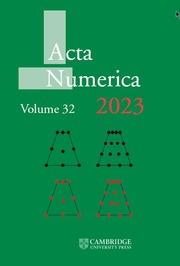Crossref Citations
This article has been cited by the following publications. This list is generated based on data provided by
Crossref.
Li, Xin
and
Micchelli, Charles A.
2000.
Approximation by radial bases and neural networks.
Numerical Algorithms,
Vol. 25,
Issue. 1-4,
p.
241.
Meir, R.
and
Maiorov, V.E.
2000.
On the optimality of neural-network approximation using incremental algorithms.
IEEE Transactions on Neural Networks,
Vol. 11,
Issue. 2,
p.
323.
Novara, C.
and
Milanese, M.
2000.
Set membership identification of nonlinear systems.
Vol. 3,
Issue. ,
p.
2831.
2000.
10.1162/1532443041424319.
CrossRef Listing of Deleted DOIs,
Vol. 1,
Issue. ,
Kon, Mark
and
Plaskota, Leszek
2001.
Complexity of Neural Network Approximation with Limited Information: A Worst Case Approach.
Journal of Complexity,
Vol. 17,
Issue. 2,
p.
345.
Maiorov, V.
and
Meir, R.
2001.
Lower bounds for multivariate approximation by affine-invariant dictionaries.
IEEE Transactions on Information Theory,
Vol. 47,
Issue. 4,
p.
1569.
Hagan, Martin T.
Demuth, Howard B.
and
Jesús, Orlando De
2002.
An introduction to the use of neural networks in control systems.
International Journal of Robust and Nonlinear Control,
Vol. 12,
Issue. 11,
p.
959.
Schmitt, Michael
2002.
On the Complexity of Computing and Learning with Multiplicative Neural Networks.
Neural Computation,
Vol. 14,
Issue. 2,
p.
241.
Alessandri, A.
Sanguineti, M.
and
Maggiore, M.
2002.
Optimized feedforward neural networks for on-line identification of nonlinear models.
Vol. 2,
Issue. ,
p.
1751.
Silva, P.Hda.F.
Fernandes, E.N.R.Q.
and
Neto, A.D.D.
2002.
A feed forward neural network with resolution properties for function approximation and modeling.
p.
55.
Li, Xin
2002.
Interpolation by ridge polynomials and its application in neural networks.
Journal of Computational and Applied Mathematics,
Vol. 144,
Issue. 1-2,
p.
197.
Menhaj, M.B.
and
Rajaei, F.
2002.
A new neuro-based state estimator.
Vol. 3,
Issue. ,
p.
III-121.
Kainen, Paul C.
Kůrková, Věra
and
Vogt, Andrew
2003.
Best approximation by linear combinations of characteristic functions of half-spaces.
Journal of Approximation Theory,
Vol. 122,
Issue. 2,
p.
151.
Pavlidis, N.G.
Tasoulis, D.K.
and
Vrahatis, M.N.
2003.
Financial forecasting through unsupervised clustering and evolutionary trained neural networks.
Vol. 4,
Issue. ,
p.
2314.
Nardin, Alessio
Schrefler, Bernhard
and
Lefik, Marek
2003.
Developments in Applied Artificial Intelligence.
Vol. 2718,
Issue. ,
p.
545.
Hammer, Barbara
and
Gersmann, Kai
2003.
A Note on the Universal Approximation Capability of Support Vector Machines.
Neural Processing Letters,
Vol. 17,
Issue. 1,
p.
43.
Chandra, Pravin
2003.
Sigmoidal Function Classes for Feedforward Artificial Neural Networks.
Neural Processing Letters,
Vol. 18,
Issue. 3,
p.
205.
Döhler, Sebastian
and
Rüschendorf, Ludger
2003.
Nonlinear Estimation and Classification.
Vol. 171,
Issue. ,
p.
381.
Kamiya, A.
Roy, R.
Ovaska, S.J.
and
Kobayashi, S.
2003.
Fusion of soft computing and hard computing for large-scale plants: an overview.
Vol. 2,
Issue. ,
p.
1441.
Lavretsky, E.
Hovakimyan, N.
and
Calise, A.J.
2003.
Upper bounds for approximation of continuous-time dynamics using delayed outputs and feedforward neural networks.
IEEE Transactions on Automatic Control,
Vol. 48,
Issue. 9,
p.
1606.

